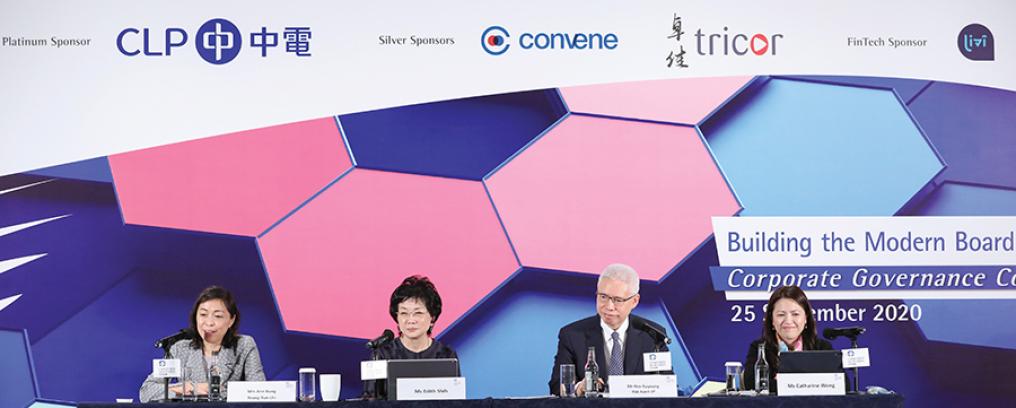
Adapting to challenging times – Corporate Governance Conference 2020 review – part two
This second part of our review of the 12th biennial Corporate Governance Conference of The Hong Kong Institute of Chartered Secretaries highlights how boards can help organisations navigate the immediate and long-term challenges of a time of unprecedented change.
The Hong Kong Institute of Chartered Secretaries (the Institute) has been holding its biennial Corporate Governance Conferences (CGCs) for over two decades and over that time its CGCs have addressed the impacts of a number of different crises – the Severe Acute Respiratory Syndrome (SARS) epidemic in 2003 and the global financial crisis of 2008, for example. Its latest CGC, held on 25 and 26 September 2020, comes at a time of multiple crises, including a global pandemic.
The conference got underway with the Guest of Honour speech by The Honourable Christopher Hui Ching-yu JP, Secretary for Financial Services and the Treasury, The HKSAR Government, setting out the government’s many initiatives to help businesses stay afloat, to keep workers in employment and to facilitate Hong Kong’s economic recovery. While these measures have been a valuable and timely prop to many businesses, Andrew Weir, Regional Senior Partner, KPMG Hong Kong, a speaker in Session 3, warned that we should not be under any illusion about the difficulties ahead. ‘The next 6 to 12 months are going to be difficult,’ he said. ‘There is still an excessive optimism about what is coming.’
He pointed out that ‘black swans’ are rare birds, but the current situation is the consequence of four of them turning up at once – social unrest, a local recession, the COVID-19 pandemic and a global recession. Moreover, these challenges are in addition to the ongoing issues that have been high on the risk agenda of organisations in Hong Kong for some time – in particular the increasing expectations regarding environmental and social performance and the challenges arising from digital disruption.
‘We are facing unprecedented times,’ he said. ‘The word “crisis” doesn’t even begin to describe it.’
Mr Weir emphasised the need for boards to be more vigilant in their risk management roles. He stressed that directors need to be monitoring the financial forecasts and in particular the liquidity risk on a more regular basis. He also recommended that ‘going concern’ issues should be a standing board item and warned that, where responsibility for key aspects of risk management is delegated to board committees and/or senior management, ultimate responsibility still rests with the board. Finally, he reminded the conference of the importance of the three C’s – conduct, culture and compliance. ‘How we behave now will be held to an unforgiving lens, so people who take short cuts to get things done are missing the big picture,’ he said.
Don’t cut corners
Since the COVID-19 pandemic struck earlier this year, many organisations in Hong Kong have been in ‘survival mode’. Panellist Thomas Atkinson, Executive Director with responsibility for the Enforcement Division, Securities and Futures Commission (SFC), pointed out in Session 3 that tough times often create the conditions in which misconduct can thrive. He warned that directors therefore need to be extra vigilant with regard to red flags indicating fraud and malpractice.
The SFC is seeing an increase in various types of fraud designed to get cash out of companies, he said, including fraudulent pre-payments for services and the use of proprietary moneylending companies. He added that, even where directors are not involved in the fraud themselves, they are culpable if they fail to play their roles appropriately. ‘Keep an eagle eye on movements of cash that don’t make commercial sense,’ he said, ‘and while the current situation lasts, ensure you have proper governance systems that watch cash depletion. Simply holding board meetings once a month may not be enough.’
In his Session 3 presentation, Dr The Honourable Moses Cheng GBM GBS JP, Chairman, Insurance Authority, reinforced the message that maintaining high standards with regards to director duties is all the more important during the current crisis. This is not only about meeting compliance obligations, he added, but about meeting high ethical standards. ‘Good governance is more than compliance with laws and regulations,’ he said.
This point was also made by The Honourable Bernard Chan GBM GBS JP, Convenor, Non-Official Members of the HKSAR Executive Council. The Closing Session of the conference took the form of a conversation with Mr Chan on the importance of private and public sector governance. ‘Often it takes a crisis to make you realise the value of governance,’ Mr Chan said. He cited his own past as an example. ‘When I started I didn’t take governance seriously enough. I learned from my mistakes and took advantage of the crisis to improve,’ he said.
Asked what advice he would give to young governance professionals starting their careers, Mr Chan pointed out that technology has made access to information relatively easy. ‘It is no longer having knowledge which distinguishes one governance professional from another,’ he said, ‘but how they apply that knowledge in practice. Execution is not easy so it is how you put your knowledge into practice that really matters.’
Ask hard questions
Governance professionals, in particular company secretaries, play a key role in ensuring that directors have the information they need to effectively oversee risk, but that task is made all the more difficult in fast moving situations of stress. Panellist Mark Johnson, Partner, Debevoise & Plimpton Hong Kong, made the point in Session 3 that information from the supply chain doesn’t always reach the board and where there are breaks in the information chain, directors are left in the dark. ‘The real problem is that too many people don’t even know the problems are there,’ he said. However this is not always down to problems in the information chain, he added. Often boards don’t discuss the issues in sufficient detail so directors don’t always spot the problems from the information they have, particularly where they take a ‘form over substance’ approach to compliance with the rules.
Helen Colquhoun, Partner, DLA Piper, also a panellist in Session 3, stressed that directors need to be able to devote sufficient time to the company’s affairs and ask the right questions during board meetings. ‘Often problems arise when directors accept the picture painted in the information they receive from management and don’t ask the right questions, or don’t ask any questions at all,’ she said. These problems are compounded where directors sit on too many boards, and/or sit on boards in jurisdictions where they don’t have a sufficient understanding of the local culture and business environment.
Take a long-term perspective
While addressing the immediate dangers presented by the COVID-19 pandemic, directors should not drop their focus on the longer-term strategic issues facing organisations. Keynote Speaker, Professor Mervyn King SC, Chair Emeritus of the International Integrated Reporting Council, pointed out that the first step in adapting to the changing environment in which organisations operate today is to recognise that ‘business as usual’ is no longer an option. He emphasised that ‘boards are operating in a completely new environment’ and consequently the mindsets of directors have to change. They need to recognise that the social contract for businesses has changed – ‘expectations have moved beyond the wealth of the shareholders to the health of the company as a whole’, he said.
Professor King acknowledged that it is not an easy time to be a director. ‘Directors have to be trapeze artists,’ he said, since they have to ensure short-term survival of their organisations while at the same time they need to build long-term environmental, social and governance (ESG) strategies that take on board the responsibilities organisations have to create value in a sustainable manner.
ESG – an outcomes-based approach
Professor King emphasised that, in the emerging environment, there will be much greater scrutiny of the outcomes of corporate operations on society. Flora Wang, Director, Sustainable Investing, Fidelity International, a speaker in Session 4, pointed out that providing better outcomes for the environment and society provides organisations with a major competitive advantage. Investors, employees and customers are increasingly concerned about sustainability issues, so organisations with a demonstrably positive environmental and societal impact will enjoy a lower cost of capital and will be more competitive in the long run.
She added that investors are also taking more facts-based assessment of the impacts of corporate operations. This means that public relations exercises, where they are not backed up by the facts, will do more harm than good. ‘Investors and other stakeholders are increasingly able to distinguish “greenwashing” from genuine improvements in ESG performance,’ she said.
She cited the example of UK online retailer Boohoo. In July 2020, the company lost a third of its market value in just a few days following reports of poor working conditions and below-minimum wage pay in its UK supply chain, which was a shock to the market as the company had a strong ESG rating by third parties, particularly on supply chain management. However, Fidelity’s internal rating for the company was always low because the analyst was not convinced by the company’s claim about strengthening supply chain management with its profit margin remaining ever strong. This highlights investors’ capability of seeing through company claims with their understanding of business fundamentals.
Pat Dwyer, Founder and Director, The Purpose Business, a panellist in Session 4 and a speaker in the webinar ESG In Practice held on the second day of the conference, pointed out that effective management of ESG risks has become a survival issue in the current environment. She highlighted two essential components of this – identifying what is most material to a business and constant engagement with stakeholders. She added that, while that engagement naturally prioritises the ‘inner sanctum’ of stakeholders, such as customers, employees and the local community, non-governmental organisations (NGOs) also bring value to the process.
Staying ahead of the digital curve
Another major strategic issue for boards is the need to accelerate and navigate the inevitable transition to the digital economy era. Panellist Dr Lee George Lam BBS, Chairman of Hong Kong Cyberport Management Company Ltd, made the point that this issue clearly has important implications for board and management recruitment. Boards need be ‘tech savvy’ he said, and this means not only getting directors with relevant expertise and mindset on the board, but also having a tech savvy management team in place.
Panellist Catharine Wong, Head of Share Registry and Issuer Services, Tricor Services Ltd, pointed out that there are many tech tools available to company secretaries in their board support work. E-board platforms, for example, have quickly become the norm. Where directors are geographically dispersed, these platforms are particularly useful as they provide a central information and communication platform, she said.
Just as important as using relevant tech tools for board support, however, is the need to understand the risks involved. Speaker Lee Wan Lik, Founder, Azeus Systems Holdings, warned that even something as ubiquitous as cloud-based IT solutions have implications for data security. Where cloud-based IT solutions are used for sensitive data, the potential vulnerabilities should be addressed by governance professionals and the board, he said. They need to consider the risks of data breaches when the data is in transmission and the question of where the data is stored.
Panellist Neil McNamara FCIS FCS, Institute Past President and Corporate Secretary, Livi Bank Ltd, highlighted the fact that boards need to work a lot faster than they may have been used to in the past to keep up with the pace of change. ‘The pace of change has been faster in the last five years that in the previous 25 years and I can’t imagine it getting any slower. Directors are facing increasing challenges in terms of what is expected of them,’ he said.


